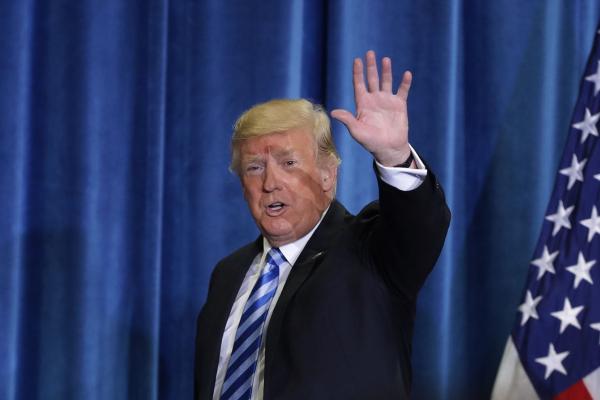Opinions 
U.S. President Donald Trump waves after speaking during an event at the Department of Health and Human Services in Washington, D.C. on Thursday, Oct. 25, 2018. (Chip Somodevilla/Bloomberg)

By Fareed Zakaria Columnist October 25 For those who believe that President Trump is a clownish know-nothing who somehow tapped into the mood of the electorate, or just got lucky in 2016, the last month has been instructive. Trump has demonstrated uncanny political instincts. When combined with his ruthless “amorality” — a term used by one of his own senior officials in an anonymous New York Times op-ed — he presents a formidable challenge to his opponents. Trump faces a familiar landscape. The party that holds the White House traditionally has low turnout and does badly in the midterm elections. But rather than accept this as inevitable, Trump has been aggressively trying to beat the odds. He’s turned what are usually disparate races in the House and Senate into a single national election, fought on an agenda that he has defined. Item one on his agenda is immigration. The reason is obvious: The issue rouses his voters like no other. Trump campaigns relentlessly on it, making the false accusation that if the Democrats win, they will open up the borders and let everyone in.
He has used the current caravan of Central American migrants to highlight his case against the Democrats. Since Republicans are also still highly motivated by fears of terrorism, Trump threw in the accusation that there are “Middle Easterners” in the caravan. (First, there is no evidence for that claim, which Trump himself even admits; and second, if there were, it is an ugly slur to imply that any Middle Easterner is a terrorist.) As the media eagerly fact-checks his rhetoric, Trump seems well aware that they are incidentally repeating his claims and reinforcing the suspicion and fear in the public’s mind. The second way Trump has turned the midterms into a national vote is by raising the specter of impeachment. Nothing would anger his base more than the notion of an elitist conspiracy (of lawyers, journalists and judges) determined to undo the results of the 2016 election. White House press secretary Sarah Sanders declared that impeachment is “the only message [the Democrats] seem to have going into the midterms.” Trump’s midterm strategy was foreshadowed by Stephen K. Bannon several months ago, when he explained, in an interview with me on CNN, that the Republicans needed to turn the midterms into a referendum on Trump. “Trump’s second presidential race will be on Nov. 6 of this year,” Bannon said. “He’s on the ballot, and we’re going to have an up-or-down vote.”
How does one counter this campaign? Many Democrats angrily maintain that they do not, in fact, favor open borders and impeachment — that their positions are more nuanced. But when you are explaining nuance in politics, you are losing. The Democratic Party has not found a way to go on the offensive and get Trump to explain that he has, in fact, a more complicated position on any given topic. But there is a substantive problem in addition to one of style and tactics. The Democratic Party is insisting that recent election results are an unmistakable sign that it needs to change course and become far more populist on economics. But the data clearly show that the American public is very comfortable with where the party is on issues such as health care and inequality. The challenge for the Democrats is a set of cultural issues — chiefly immigration, but also things such as transgender bathroom laws and respecting the flag — on which a key group of Americans thinks the Democrats are out of touch. An excellent study by the Democracy Fundfound that people who had previously supported Barack Obama and then voted for Trump in 2016 (a crucial segment that Democrats could win back) agreed with the Democrats on almost all economic issues but disagreed with the party on immigration and other cultural matters. Put simply, the study makes clear that the challenge for the Democratic Party politically is not whether it can move left economically but whether it can move right on culture. I say this as someone who agrees with the Democrats on almost every one of these cultural issues. But a large national party must demonstrate that it can accommodate some people who disagree with it on some issues. Doing this without abandoning one’s core principles is a challenge, but it is a challenge Democrats will have to embrace if they seek a durable governing majority. Eventually, the electorate will be more young and diverse, but in the meantime, the Republican Party is utterly dominant in American politics because it owns the bloody crossroads where culture and politics meet.
|




